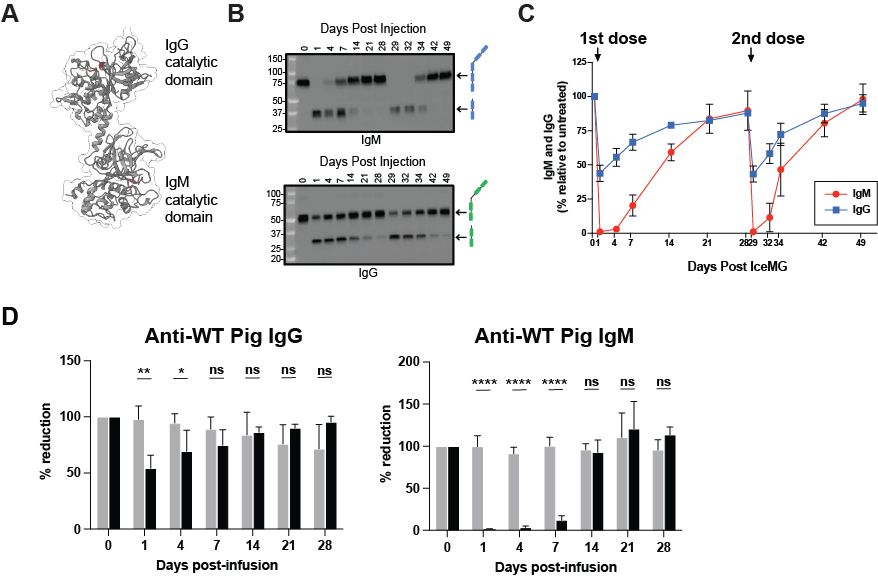A novel IgG and IgM cleaving endopeptidase, iceMG, for xenotransplantation
Alessandro Martinino1, Zishen Li1, Timothy Smith1, Davide Schillrio1, Zachary Elore1, Janghoon Yoon1, Emma Fatzaun1, Rafaela Beloni1, Victoria Z Ferrara1, Matthew Tunbridge1, Nagham Bazzi1, Kwan wai Fung1, Meghan Hu1, Shengli Song1, Annette Jackson1, Stuart Knechtle1, Aravind Asokan1, Jean Kwun1.
1Department of Surgery, Duke University, Durham, NC, United States
Introduction: Xenotransplantation is a promising approach to tackle the severe organ shortage. However, antibody-mediated rejection (AMR) remains a significant obstacle, with preformed xenoreactive-antibodies (IgG and IgM) playing key roles. We aim to investigate the effectiveness of IceMG, a newly developed recombinant endopeptidase that simultaneously cleaves IgG and IgM, offering a potential therapeutic strategy to prevent or mitigate AMR in xenotransplantation.
Methods: Eight rhesus macaques were sensitized with two sequential skin allografts, with four receiving two intravenous doses of IceMG (2 mg/kg, Figure 1A) spaced 28 days apart. Circulating total IgG and IgM levels with their split products were assessed with western blot. We also evaluated allo-specific, xeno-reactive and vaccine-specific antibodies using flow-crossmatch. We also monitored B cell subpopulations after IceMG treatment.
Results: IceMG administration resulted in a statistically significant but temporary reduction in total IgG and IgM levels (Figure 1B and 1C). Likewise, allo- and xenoreactive IgG and IgM, as measured by T cell and B cell flow crossmatch, showed a significant decline, returning to baseline within two weeks (Figure 1D). Using a pathogen-specific multiplexed reporter cell panel, COVID-19–vaccinated NHPs showed a reduction in IgG and IgM responses against SARS-CoV-2 antigens, including the spike protein, RBD-SD1, and S2 domain antigens. Repeated IceMG treatments produced similar antibodies depletion/repletion kinetics. IceMG significantly but transiently reduced the frequency of IgM+ B cell (p = 0.04) without affecting IgG+ or IgD+ B cells, suggesting a temporary loss of membrane IgM.

Conclusion: IceMG effectively cleaves both IgG and IgM simultaneously, showing potential as a new therapeutic option for AMR in organ transplantation including xenotransplantation. Further studies are needed to refine dosing strategies and assess long-term immune effects.